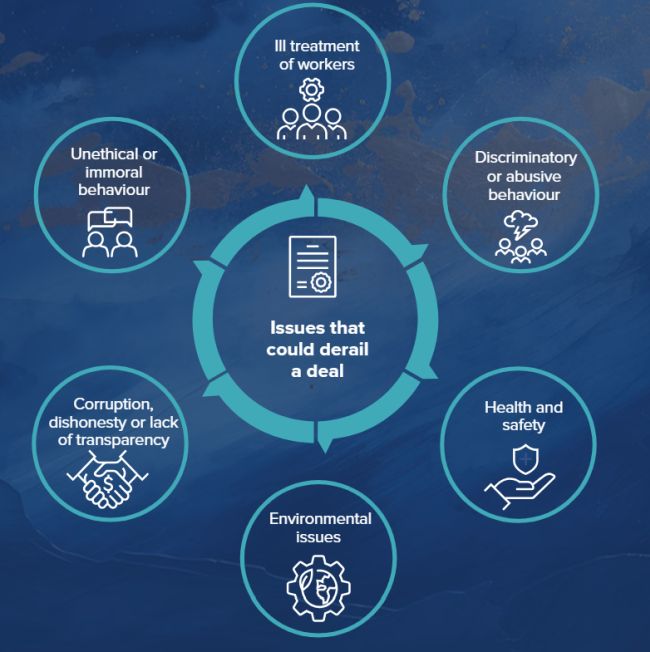The importance – and expansion – of ESG
Environmental, social and governance (ESG) issues have been key considerations in M&A transactions for a number of years. And we have charted the evolution of ESG issues on M&A in previous reports, including the development of a forward-looking approach to ESG due diligence, the impact of increasing regulation of ESG issues and the role of ESG as a driving force in transactions.
It is an area that continues to evolve – and drive change. The growing reporting requirements around the globe mean that scrutiny of a company's performance in this area as part of the deal due diligence is becoming easier and more commonplace. However, as well as navigating these reporting requirements, companies are having to engage with a wide variety of stakeholders including their own shareholders, clients, employees, financiers and activist groups – and the approaches of these various stakeholder groups do not necessarily align, and may also vary within a particular stakeholder group from jurisdiction to jurisdiction.
At the same time, the factors which contribute to a business being considered a good corporate citizen are constantly evolving. Treating stakeholders such as employees, contractors and customers fairly and with respect is a baseline expectation but businesses also need to consider how they interact with, and their impact on, the communities in which they operate. Such concerns do not just relate to companies in the same corporate group; there is a growing focus on a business's wider supply chain and, in a number of jurisdictions, businesses have suffered reputational damage from the acts or omissions of entities in their supply chain, for example dangerous working conditions or underpayment of staff.
Similarly, while environmental factors have long been in the spotlight, there is a growing expectation on businesses to understand and manage biodiversity-related risks coupled with a steep rise in biodiversity-related laws and policies globally. We can expect to see more adverse publicity and claims in this area in certain jurisdictions.
According to a survey conducted by Deloitte, two-thirds of the 250 C-suite executives and senior and mid-level leaders at corporations that reported at least US$500 million in revenue consider ESG to be of high or very high importance in M&A activity.
Deloitte's ESG in M&A pulse survey: ESG's evolving role in corporate M&A decisions
How do these developments affect M&A activity?
As well as affecting the day-to-day operations of businesses, these issues have an impact on M&A in a number of ways. The ever-expanding list of issues needs to be factored into parties' high-level strategic planning on both the buy- and sell-side from the outset.
Driving a deal
ESG factors may act as a driver for the deal. On the environmental side, a transaction can create a solution to a problem – be it by disposing of a "dirty" business, or acquiring a clean one or one that will facilitate a greener solution to a problem the company is facing.
Even if it is not the primary driver for a deal, buyers should consider corporate responsibility issues to identify targets which could be described as "good corporate citizens" and so, as a minimum, will not result in reputational damage to the buyer but ideally will go further and enhance the standing of the buyer's group. Conversely, sellers may decide to divest subsidiaries which are not meeting the ever-higher standards now expected of businesses. However, sellers also need to be mindful of the need for responsible exits and offloading a troublesome subsidiary rather than working to improve its behaviour could reflect poorly on their own standing.
Due diligence
Buyers need to decide what level of due diligence they will conduct around ESG factors. There is increasing acceptance that dealing with ESG issues is not just a tick-box exercise driven by the regulatory environment relevant to the target group. Whilst compliance with the relevant requirements is important, buyers are increasingly investigating a potential target's overall level of corporate responsibility. The potential for a bad deal to go wrong and result in reputational damage will not be discovered through a tick-box exercise.
Financing a deal
Where finance is required for a deal, the financing arrangements (and the potential for ESG issues to impact them) should be considered at an early stage. Many finance providers are developing increasingly sophisticated approaches around ESG, and corporate responsibility more generally. This is being driven in no small part by activists targeting banks themselves if they are seen to be lending to what the activists deem to be unacceptable businesses.
Contractual protection
Whilst due diligence is an important consideration, parties will need to follow up on their findings by seeking appropriate contractual protection, be it through warranties, indemnities or post-completion covenants to minimise financial or reputational damage. The market and market participants are yet to establish what their baseline/common approach should be to ESG type warranties and other protections.
Transaction management
Contractual protection Whilst due diligence is an important consideration, parties will need to follow up on their findings by seeking appropriate contractual protection, be it through warranties, indemnities or post-completion covenants to minimise financial or reputational damage. The market and market participants are yet to establish what their baseline/common approach should be to ESG type warranties and other protections. Transaction management Parties need to be prepared for issues arising unexpectedly during the deal execution phase which could potentially derail the whole process, such as claims around inappropriate behaviour by the target's senior managers, reports highlighting unacceptable supply chain practices or even geopolitical events which take precedence for one or more of the parties. In any such circumstances, the parties need to make a considered decision about whether to progress with the deal and what adjustments, if any, are required. They will each need to present a well thought-out explanation for their decision to all relevant stakeholders, remembering that when damaging revelations surface, a lack of transparency in the response often creates more problems than the original wrongdoing.

The content of this article is intended to provide a general guide to the subject matter. Specialist advice should be sought about your specific circumstances.




